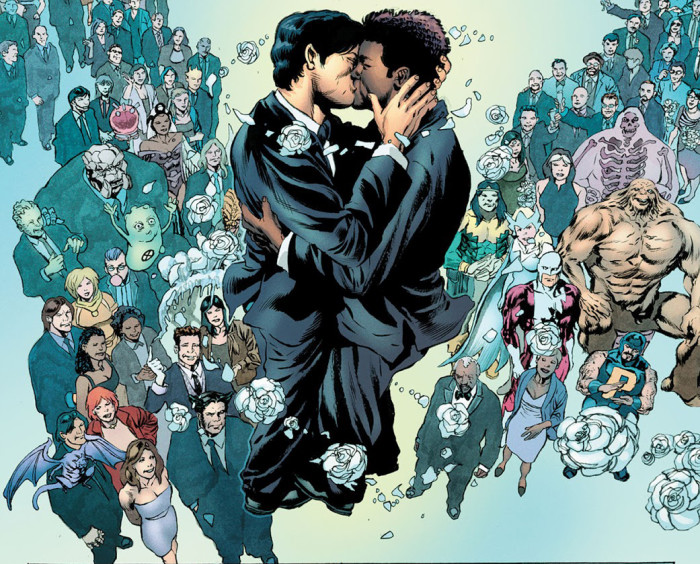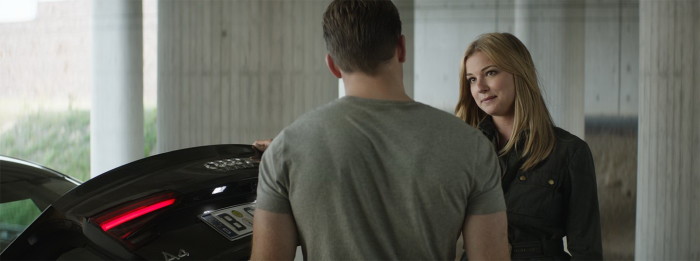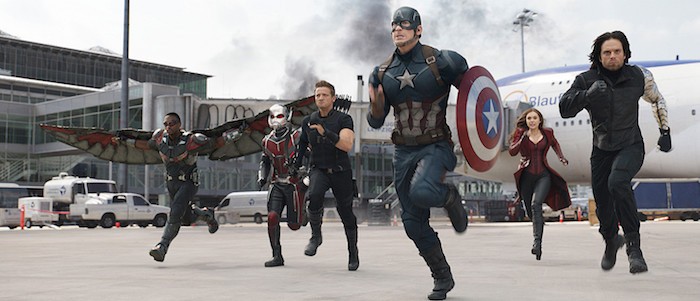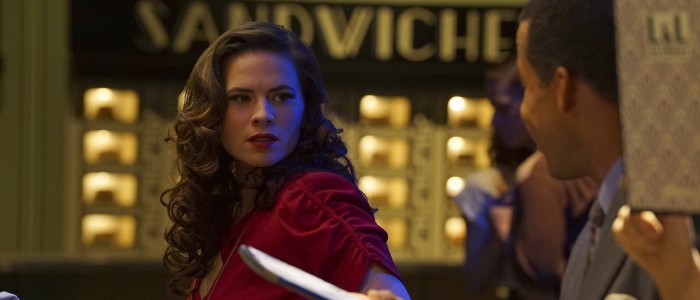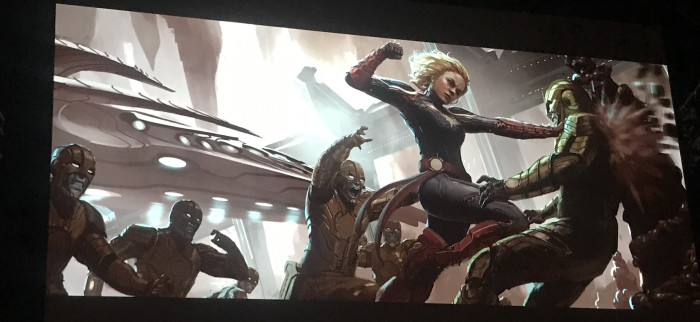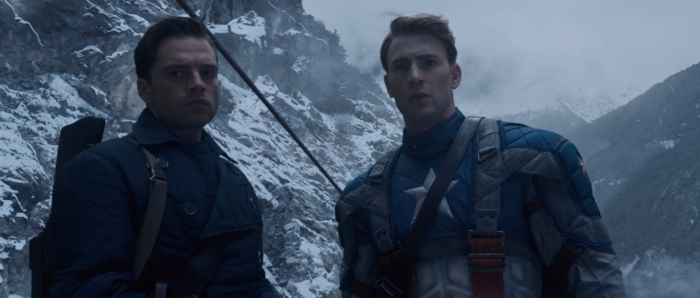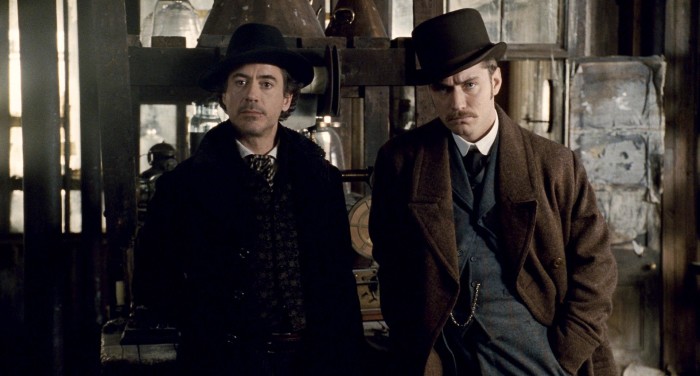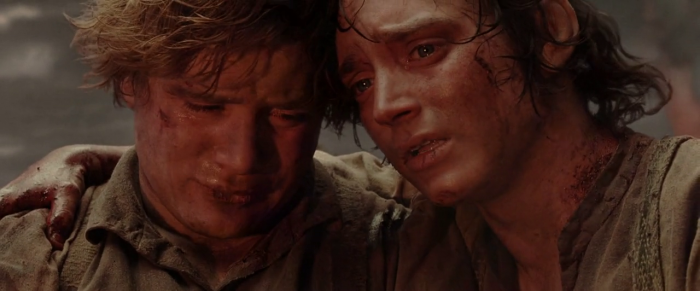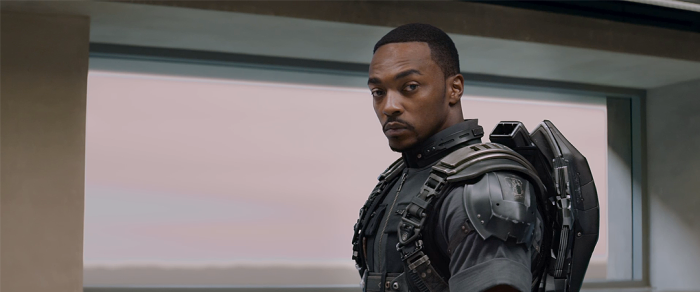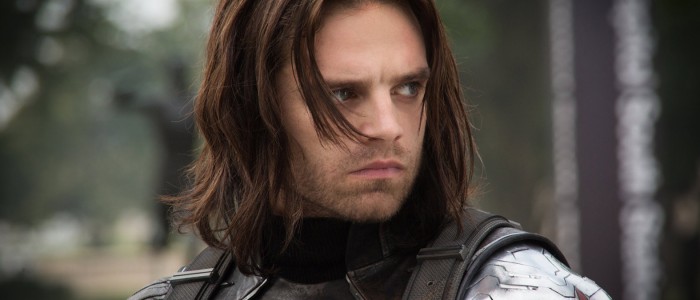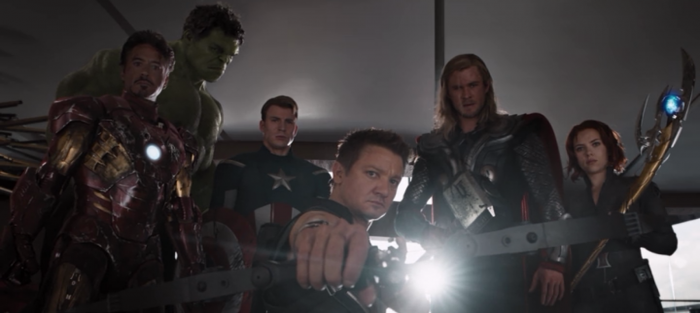The Fragile Masculinity Of The MCU (Or Why Captain America Shouldn't Be Afraid To Cry)
(Welcome to The Soapbox, the space where we get loud, feisty, and opinionated about something that makes us very happy...or fills us with indescribable rage. In this edition: a dissection of the fragile masculinity of Marvel movies, the overlooked homoeroticism of superhero stories, and how everyone can do better.)
The Marvel Cinematic Universe. Whether you realize it or not, it's considered one of the biggest pop culture institutions defining modern American manhood. Heroes like Captain America, the Falcon, Iron Man, War Machine, Hawkeye, and Thor are considered red-blooded, hypermasculine American men (despite Thor's role as a Norse god), and even outer space heroes like Star-Lord and lower-rung Avengers like Ant-Man evoke the ideals of fanboy manhood through snarkiness and Teflon attitude.
But all of this is really just a façade for a bubbling societal fear. These characters are archetypes for the fragile masculinity that affects too many men in America. That fear of not being "masculine" enough leads to misogyny, self-loathing, fear of homosexuality, and, at its most extreme, the deaths of gay and trans people (usually trans women).
I can already feel you getting overwhelmed, so let me scale this discussion back a bit to look at the small picture: Marvel and Disney. How does Marvel and Disney's beloved MCU perpetuate this idea of fragile masculinity? How does it affect their audience? And, most importantly, what can they do to stop the cycle? Take a journey with me as I pick apart the MCU, its men, and why Marvel and Disney shouldn't be afraid to show them as the vulnerable, soft-hearted human beings they actually are.
Marvel in Print Versus the MCU
The Marvel universe is decidedly more diverse in both ethnicity, gender, and sexuality in print than it is in Marvel's official film canon. As far as sexuality goes, Marvel has been just as responsive to changing tastes. Iceman, one of the original X-Men, was revealed to be gay in Uncanny X-Men (and starred in his own solo series). Another X-Men member, Northstar, got married to his non-powered, non-superhero partner Kyle in Astonishing X-Men. And, interestingly enough, one of Captain America's best friends from the 1940s is gay. Arnie Roth, whose first appearance was in Captain America #268 in 1982, was Captain America's (aka Steve Rogers) big brother figure and protector on the mean streets of Brooklyn before Steve became the serum-powered superhero as we know him today. You can read more about the story at Uproxx, but the gist of it is that Arnie is one of the first openly gay characters in the Marvel universe, living with his long-time boyfriend Michael.
But none of the consideration that goes into Marvel's print stories seem to make its way to the film retellings. There are few black superheroes in leadership roles. Even then, is Nick Fury, who was the only prominent black leader in the MCU until Black Panther, an actual superhero or just a government operative? And would Marvel's film team have really given us a Black Panther movie if there wasn't an outcry about the lack of a black superhero film? How come it's taken approximately 10 years for the MCU to introduce a female superhero film when DC, regardless of what you say about their film franchise, has introduced Wonder Woman from the beginning of the DCEU? And how come no gay superhero has been announced for any point of the MCU's future phases?
The Superhero Glass Ceiling
Women certainly aren't given the same weight as men in the MCU. Regardless of whether the woman is a bonafide superhero like Black Widow, a high-powered assistant like Pepper Potts, or a highly competent S.H.I.E.L.D. agent like Peggy Carter, the women of the MCU serve three main functions: to look pretty, hit the bare minimum required of a "strong" female archetype, and (most importantly for the MCU) serve as the love interest for the male superhero. A reward for a job well done, if you will. At worst, the love interest serves as a blank canvas for the male superhero to throw his emotional baggage onto. This was at its most egregious in Doctor Strange, when awful Stephen Strange releases an ugly spout of vitriol at his sometimes-girlfriend Christine Palmer. Don't forget, though, that Christine is a doctor in her own right, not to mention a colleague of Strange's. Yet, her role and her work is treated in a subordinate fashion to Strange's, who gets to use her as a basis for his character development.
While Strange's treatment of Christine was anger-inducing, the script's treatment of Sharon Carter, Peggy's niece, in Captain America: Civil War, was perhaps the most disgusting. In this film, Peggy finally succumbed to her battle with Alzheimer's. After Peggy's funeral, Cap and Sharon immediately launch themselves into a relationship, a relationship that had been annoyingly hinted at since Captain America: The Winter Soldier.
I think you can tell what makes this so disgusting: it's Peggy's freaking niece, plus the fact that Peggy wasn't even cold in the ground yet before Steve decided to put the moves on a woman who, in an alternate universe where he and Peggy stayed together, could have very well been his own granddaughter. It's a move many reviewers had issues with, including Vanity Fair's Joanna Robinson, who writes "Doesn't Captain American: Civil War go out of its way to 'define' Bucky and Steve's relationship when Cap smooches Sharon Carter (Emily VanCamp) while Bucky looks on approvingly? Where's the room for interpretation in that moment? And, leaving aside the vague creepiness of Steve making a move on Peggy's (very willing) niece, the moment itself wasn't necessary to the flow of the movie at all."
Even Hayley Atwell, who portrayed Peggy in the MCU said that Peggy would be "turning over in her grave."
What also makes this relationship insidious is that it occurs in a film in which Steve is dealing with two other close relationships, both of which are with men. He's caught between his allegiance to Bucky, his old childhood friend who had been turned into the Winter Soldier by HYDRA, and his new friendship with Sam, aka The Falcon, who has been by his side since their first meeting in Captain America: The Winter Soldier. Both of these relationships, as you'll read about later, have been speculation fodder for Steve's sexuality. How interesting that, in this of all the MCU films, Captain America is written to uncharacteristically go after a woman — his former flame's relative, no less — in such a lecherous fashion. Even without the fragile masculinity overtones, the move is just gross. But when put in the context of gender and sexual studies in the media, it becomes apparent that Marvel wanted to put an end to the Cap-is-queer speculations. However, they only made fans that much louder.
The Lonesome Death of Agent Carter
Perhaps the only MCU woman who has truly separated herself from the traditional MCU mold for women is Peggy. Peggy became more than just "Captain America's girlfriend" and was established as a true founding member of S.H.I.E.L.D. in the ABC show Agent Carter. The show allowed Atwell to expand the boundaries of the character, who did embody the same ideals as Captain America himself and, I'd say, became a Captain America in her own right in his absence. She was also able to subvert the traditional gender roles by having a male sidekick, Edwin Jarvis — Howard Stark's butler and happily married man who was the domestic one in his household while his wife was out (presumably working) — help her along in her missions.
Peggy also dipped into the category of queer representation with her friendship with diner waitress Angie Martinelli, a relationship many in the Agent Carter fan community felt could be a romantic one between queer women. However, despite Angie's possible role as a girlfriend (if the show was allowed to continue past two seasons), she was still developed as her own, well-rounded character. You could tell this woman had a life of dreams, and that she would pursue those dreams with or without Peggy. Ditto for Peggy about Angie.
This gender reversals and depth of character came about because of Agent Carter's writers, Tara Butters and Michele Fazekas. I doubt the show would have been as sensitive about female characterizations and relationships if it was written by men. As we've seen in Joss Whedon's leaked Wonder Woman script, women are usually written as a means for men to act out their emotional junk, not to exist as humans taking up emotional and societal space. Agent Carter's cancellation was linked to low ratings, but how much of that low viewership came from ABC's lack of overt marketing, which is reserved for its other, more boy-centric Marvel show Agents of S.H.I.E.L.D.? ABC just didn't know what to do with a comic book property that didn't fit the standard mold. If even Marvel brass like Jeph Loeb, head of television at Marvel, was blindsided by Agent Carter's cancellation, then it would seem that ABC really just wanted out of a property they couldn't wrap their heads around. On some level, it would seem that women-centric superhero shows aren't allowed to flourish because of a fear that the "demographic" — men and boys — aren't watching.
The fear of men not watching female-generated, female-led films and television has weaseled its way into the upcoming MCU film, Captain Marvel, the first female-led superhero film for the franchise. However, Carol Danvers won't be alone in her film. It's been reported that Samuel L. Jackson will star alongside Brie Larson (who is playing the titular character). Does Captain Marvel need a man's presence? While Nick Fury has had roles in other MCU films, he's always been a supporting player, not a co-lead, as is being reported. Why the big role upgrade? Is it indicative of Marvel's fear of boys and men tuning out to see a female-led film? Also, is Marvel letting this fear prevent them from finally giving Black Widow, one of the two Avengers without an origin film (the other being The Falcon) her own standalone movie? I'd say she's owed one.
If men are always allowed to write for women in either the MCU or the DCEU (because, for better or worse, Whedon has been tied to the upcoming Batgirl movie), and if marketers are always afraid that men won't tune into media starring women, how will women characters ever begin to evolve beyond boobs and butts with mouths? More importantly, how will society ever begin to tackle the lack of empathy for women and women's issues if more effort isn't put into giving women characters a voice in the media? Once that happens, once men at large realize that watching a movie starring a woman doesn't make you a "girly man," then some of this fragile masculinity might start to fade.
Romantic Friendship, Sexual Identity, and Homoeroticism in the MCU
What Disney and Marvel have failed to realize is that by disregarding female characters and overstuffing their film lineup with male characters, the MCU has more in common with the homoerotic themes found in Sherlock Holmes and The Lord of the Rings. How? Because unknowingly, Marvel and Disney have put the MCU in the context of "romantic friendship"
This type of friendship, also called "moral friendship," was the rage in the 1800s, when it was seen as morally and societally appropriate for men and women to have close same-sex relationships. According to Axel Nissen's Romantic Friendship Reader, Victorian England valued "spiritual relationships both between and within the sexes and devalued erotic relationships regardless of the gender constellation of the couple involved."
However, as the turn of the century came around, writes Vincent A. Lankewish in a Lambda Book Report review of Romantic Friendship Reader, "the injunction for men to marry became more pronounced, and the supposedly 'platonic' nature of male friendships more suspect."
These relationships were never outright defined as romantic relationships, but there were quite a few who actually were romantic relationships. The fine line between friendship and romance has made this time period one of the starting points for modern queer theory.
This type of bonding is prevalent in the Sherlock Holmes stories of the time period. Sir Arthur Conan Doyle's books have been a staple in modern queer theory and queer literature studies, since Holmes and Watson's relationship could, depending on your reading of the texts, fall squarely in line with the moral friendship ideal.
Watson is deeply emotionally attached to Holmes as his friend and biographer and does love Holmes (in whatever sense of the word you take it to mean). As Melissa Caro Lancho writes in her paper Holmes and Watson or Sherlock and John: A Homoerotic Reading of Conan Doyle's Characters in BBC's Sherlock for the Autonomous University of Barcelona, Watson inserts a rare moment of personal opinion in A Scandal in Bohemia, when he describes Irene Adler, who becomes "The Woman" to Holmes, as being a woman "of dubious and questionable memory" in a paragraph rationalizing how Holmes didn't feel "any emotion akin to love" for Adler since [a]ll emotions, and that one particularly, were abhorrent to his cold, precise, but admirably balanced mind...as a love he would have placed himself in a false position." However, in other stories, we do see that Holmes does have emotion and does actually care about most of his clients, including women. Holmes is once again uncharacteristically emotional in The Adventure of the Three Garridebs, when Watson is shot. Watson writes later how he saw Holmes' emotionally reserved façade crack:
"It was worth a wound — it was worth many wounds — to know the depth of loyalty and love which lay behind that cold mask. The clear, hard eyes were dimmed for a moment and the firm lips were shaking. For the one and only time I caught a glimpse of a great heart as well as of a great brain. All my years of humble but single-minded service culminated in that moment of revelation."
It's worth noting that the speculation over Holmes and Watson's relationship has been the intentional undertone of several Sherlock Holmes productions, including Billy Wilder's 1970 film The Private Life of Sherlock Holmes and in the more recent Guy Ritchie Sherlock Holmes films, which includes Robert Downey Jr. stating in interviews that he consciously played Holmes as gay. (It's also worth noting that Doyle himself, as Cathy Camper writes for Lambda Literary, had liberal views towards homosexuality.)
J.R.R. Tolkien's The Lord of the Rings books, on the other hand, were written decades later, after moral or romantic friendships became less of an aspiration and more of a societal aversion thanks to the development of the terms "homosexuality" and "homosexual" in the late 19th century.
However, Tolkien still utilized the same principles of romantic friendship in his characterizations of Frodo and Sam, Sam in particular, who outwardly expresses love for Frodo in the book The Lord of the Rings: The Two Towers:
"Then as he had kept watch Sam had noticed that at times a light seemed to be shining faintly within; but now the light was even clearer and stronger. Frodo's face was peaceful, the marks of fear and care had left it; but it looked old, old and beautiful, as if the chiseling of the shaping years was now revealed in many fine lines that had before been hidden, though the identity of the face was not changed. Not that Sam Gamgee put it that way to himself. He shook his head, as if finding words useless, and murmured: 'I love him. He's like that, and sometimes it shines through, somehow. But I love him, whether or no.'"
This type of romantic friendship is acceptable because of its basis in war; Tolkien's books were written based on his time serving in World War I, where he saw many close relationships between men on the battlefield. As Tolkien's grandson Simon Tolkien writes for the BBC:
"The companionship between Frodo and Sam in the latter stages of their quest echoes the deep bonds between British soldiers forged in the face of overwhelming adversity. They all share the quality of courage which is valued above all other virtues in The Lord of the Rings."
Captain America, the Falcon, and the Winter Soldier
The MCU's same-sex friendships fit the bill for romantic friendship, which, just like back in the day, could be taken at face value as platonic friendship, or could actually be portrayed as real romance. Take for instance one of the clearest instances of latent same-sex attraction: Captain America and The Falcon.
Steve and Sam, the man who will eventually become The Falcon, essentially meet in a standard rom-com meet-cute, with both of them jogging around the National Mall. They have a flirty convo about Steve getting used to his new-fangled life (complete with Sam suggesting he listen to Marvin Gaye's Trouble Man soundtrack), then they later meet at Sam's VA counseling job, where they have a deeper conversation about what Steve wants out of life. All the while, Natasha (Black Widow) is trying to play matchmaker for Steve, constantly hooking him up with all the wrong women. If this were actually a rom-com, the ending would be the standard one for most rom-coms: the right person for Steve was Sam, the guy right in front of him all along.
Caroline Siede wrote about this rom-com pattern in her review for the A.V. Club., writing that "Winter Soldier smartly avoids shoehorning in a romance between Steve and Natasha. Instead, it's Anthony Mackie's Falcon who fulfills the narrative beats of a Steve Rogers love interest. In contrast to Black Widow's nuanced motivations, Falcon joins the climactic battle simply to be around Steve."
Sam continues his love-interest role in his small part in Avengers: Age of Ultron, when he accompanies Steve to Tony Stark's party as...what, exactly? His friend? A romantic plus-one? Who's to say? The lines are blurred, especially when, once they are alone and Steve starts talking about finding a place to stay, Sam replies with "home is home." Steve looks contemplatively at Sam after saying this. Again, if this were another movie or if Sam were a woman, Steve's look would be taken primarily as a clue that he feels his home is with Sam.
Steve's relationship with Bucky is equally as homoerotic as his relationship with Sam. Like with Arnie Roth, Steve grew up with Bucky; however, Bucky was intensely close with Steve. Steve effectively follows Bucky into war in Captain America: The First Avenger, and as some fans believe, was more distraught about losing Bucky than he was about being lost to the ice.
"I think it was very clear that Peggy Carter was the first woman not just to give [Steve] the time of day, but to believe in him and to give him support and trust and honesty, and all of these things I think he was hungry for," said Chris Evans to Flickering Myth about the possibility of a Bucky/Cap alternate reading. "And I thought I put that all in that final scene, but maybe I didn't. Maybe I was just gazing at [Bucky's actor] Sebastian [Stan] too much."
Steve's fervent hope to find Bucky continues throughout Captain America: The Winter Soldier and Captain America: Civil War, which not only fuels Bucky/Cap fans, but also created a jealousy-tinged triangle between Cap, Falcon, and Bucky. Sure, that triangle aspect is played up for laughs, but the small amount of tension is subtly utilized in the movie because, even with a straight reading of Steve's relationships, there's bound to be weird friction between Bucky and Sam that could be mined for comedic effect.
Tony Stark (aka Iron Man) and his relationship with his best friend James "Rhodey" Rhodes could also be seen in a "romantic friendship" context. Yes, canonically, Tony is joined at the hip with his sometimes-girlfriend and assistant Pepper, but he's just as joined at the hip with Rhodey. In fact, much of the same banter Tony would have with Pepper could be used, almost verbatim, in conversations with Rhodey. Some of this might be because Tony is basically written like Bugs Bunny — he reacts to everyone in the same, wise-cracking way. But, it's also indicative of how comfortable Tony is with Rhodey, so comfortable that he employs his same exasperating flirting technique with him as much as he does with Pepper. Indeed, Rhodey and Pepper primarily serve the same function in Tony's life — as a gut-check, overseer, and emotional support system. However, is it because Pepper is a woman that a romantic relationship (a rather odd and sometimes-forced one, at that) is allowed, while Rhodey is primarily stuck in "loyal black sidekick" mode, much like Sam?
How Disney Can End the MCU’s Fragile Masculinity
Disney and Marvel could go far if they just face the facts — they are avoiding the important task of creating vulnerable male characters in general. Regardless of whether the character is gay or straight, it would mean a lot if Marvel superheroes were simply allowed to show emotions other than anger and snarkiness. Imagine if we saw a superhero that was allowed to cry and was still seen as a strong, American hero. With all the junk Steve's been through, you'd think we'd have seen him ugly cry on screen by now. But such emotions are still relegated to women and young boys, like Spider-Man. We saw poor Peter Parker have a nervous breakdown when he was trapped under the rubble in Spider-Man: Homecoming, and that was important for us to see in terms of his development as a young man and as a superhero. However, another reason he was allowed to show these emotions is because he's a boy, not a jacked-up man. He's still seen as moldable clay, and he's still being molded into a man that doesn't cry.
It would also be great if Marvel finally put an openly gay superhero in the films. There's a reason #GiveCaptainAmericaABoyfriend took off: there's literally no representation in Marvel's film franchises of positive gay characters. If you want to get technical, Deadpool is the first Marvel LGBT superhero, but he's not part of the MCU license, is he? He's still with 20th Century Fox. So still, the onus is on Disney to come through with correcting this oversight. Eventually, money will have to stop being used as an excuse to push the ball along with proper LGBT representation. Representation in films positively affects not just the bottom line, but it also helps today's youth with their self-esteem. It educates audiences, and, in the long run, can provide more empathy for other groups. More empathy and feelings of acceptance could lead to less suicides, less murders, and a lower rate of fragile masculinity.
There's so much a gay superhero could do, if only they are allowed to come out of the closet.

